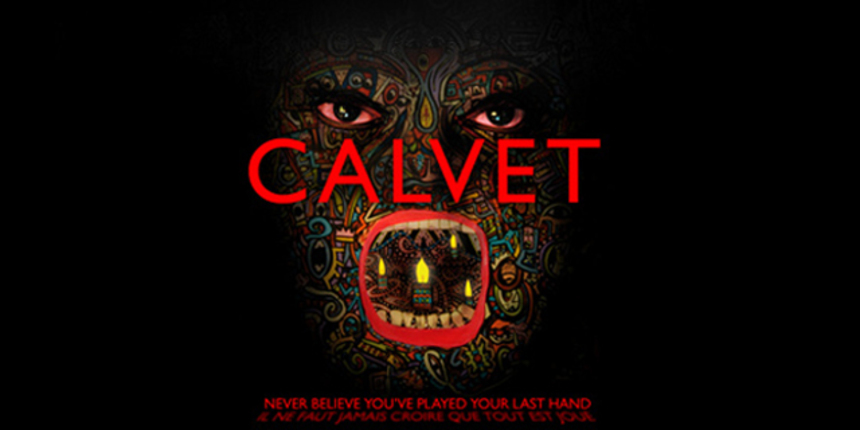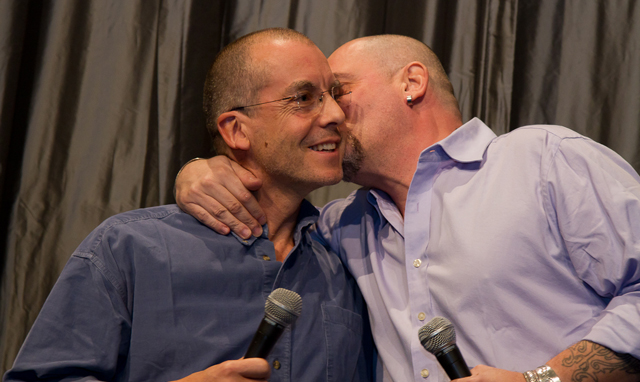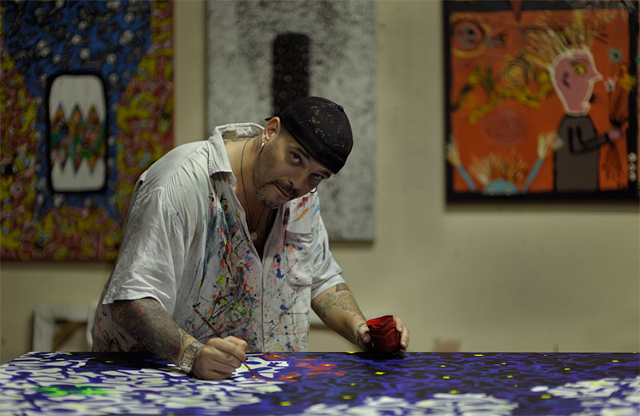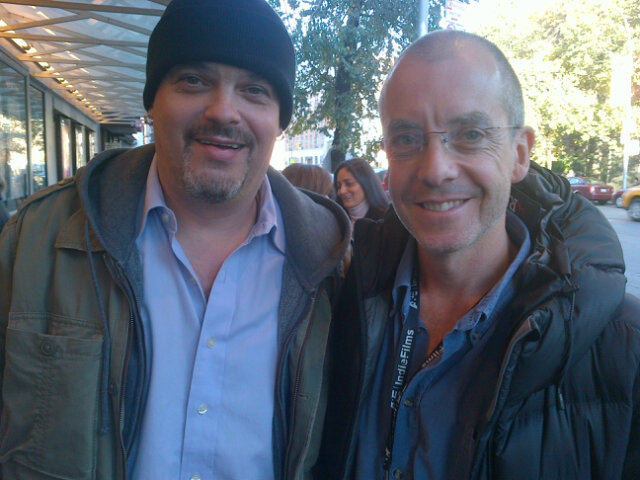Interview: CALVET Director Dominic Allan

Earlier this year at the Edinburgh International Film Festival I had the chance to see Calvet (read my review here), a powerful and gripping documentary about a French painter called Jean Marc Calvet who turned his troubled life around. It struck a chord of brutal honesty and was quite unlike any other documentary I'd seen before because of how narratively driven it is and the way the visuals enhance the story.
In the run up to the film's UK theatrical release before it premières on TV next month, I got the chance to speak to director Dominic Allan about his experiences of making the film and talking to Jean Marc.
ScreenAnarchy: How did you get involved with the project?
Dominic Allan: I've been making documentary films for television for some time but the fire kind of died inside. I'd gone to live in South America and at one point I was traveling with some friends in Central America. We were driving from Costa Rica to Nicaragua and I remember sitting in the back of the car and they were talking about this French guy who was, I can't remember if he'd been a mercenary or he'd robbed a bank... he started painting, he'd never painted before but he was painting like a mad man.
I didn't actually know if it was a tall story or not at the time but then we arrived in this small town called Grenada, an old colonial town, and I went in this cafe he had then and I walked in and the first thing I saw was - it just stopped me dead in my tracks - this painting on the wall which was called "La loco de la casa," translated it means "the mad woman of the house." I don't know a lot about art, I've always been more fond of photography, but this thing was [just] screaming off the wall. It was very colorful, very tortured, and I thought "who the hell painted that?" And then I saw this guy and my friends were saying he was the guy they were talking about in the car and he painted that thing and I just thought, "he sounds like a character." And then I spoke to him, he came to the table and I said to him "I like your painting," so he took me next door to his studio and he was hauling all these canvases out of these racks. He was painting 7 days a week, 14 hours a day, he was telling me everything in them. He was quite a character.
ScreenAnarchy: Were you intimidated at all?
Allan: No, no, not at all... I've been a film maker for years and I've met all sorts of people, believe me. And I've been in some pretty dangerous situations all over the place. I've made war films, I've made a film about [Nelson] Mandela for the BBC, I made a film about an oil pipeline once.... I wasn't intimidated by him at all, not to me. I kind of clicked with him.
He was telling me all this stuff and there was something about him that sort of mesmerized me, I didn't quite know what that was. He clearly has some sort of extreme past and I didn't know what that was either because of all his paintings and all that.... Then he was locking up these gates afterwards and I remember saying, "Good thing you're locking up. I don't know much about art but I think your stuff [is] gonna' be worth something some day." Then he said "don't worry about that I've got this guy up here," and there was this bloke up by this church perched above the house, a sort of 24-hour armed guard he'd paid to overlook the property... and then this sort of paranoia emerged. [Back] in 2004 he was very paranoid. One of our friends had stayed with him before and he had at that time an 11 o'clock curfew and if you stayed with him you were either in or you were out; if you were out you stayed in a hotel and if you were in you stayed in your bedroom... you could go to the bathroom but that was it because at 11 o'clock he locked the door, and barred it and padlocked it. He had this ritual that lasted an hour every night where he set 50 traps across the whole floor, from the front door to his bedroom door. This guy had been a special forces soldier so anything like strings on glasses and broken glass, anything you could trip over and make a noise that would wake him up. Also he had this Rottweiler at the time who slept outside his bedroom door, the door was locked, another dog inside and he slept with a loaded gun under his pillow.
So I heard this and I sort of just left it there, I thought he sounded like a complete nutter [laughs]. I left it and I was doing a couple of other things, actually I made a couple of other films and then I called him up and went back to see him, it was actually almost two years later, and said, "Remember me? Don't know if I told you I was a filmmaker. Would you be interested in this idea if I came and talked to you, to find out a bit more about you?" He said yes so I got to talk to him for 10 days and I'd just never heard a story like it. We got on very well, the trust sort of emerged - he was quite suspicious at the beginning - and it moved from there... so that's how I met Jean Marc Calvet.

(Above) Dominic Allan with Jean Marc Calvet
ScreenAnarchy: When you set out to make the film did you want to really get into the mind set and wrap yourself up in his story or stand back and be objective?
Allan: A bit of both. [With a] documentary you have to plunge yourself into any subject, completely submerge yourself. And you make choices, at the end of the day it's quite structured in terms of the story you're going to tell, how you're going to structure it... Once you're in those sequences and you're filming him in certain places obviously you let life run, and you make that as natural as can be. I mean, he's revisiting the past, all those places which he'd never been back to, and we made sure when we shot it we did it first time. So everything is completely real, you have to let life unfold before you, that's the integrity of documentary filmmaking. But yes I completely submerged myself in his story and I am fascinated generally by the psychology of us, how we behave and why we do what we do. And I was just fascinated by this man who had taken on this persona... I don't know if you'd call it schizophrenia, dual personality, I think it's actually just an extreme case of what we all do which is to assume personalities, assume personas - even if we don't realize it half the time - to cover up our true nature. And I think he just [had] become this sort of animal to survive after all the things that had happened to him.
I think the intriguing thing is his story is so extreme and yet we identify really strongly. I think there are several reasons for that. First of all, like I was just saying, I think we all do that, we assume identity, we have a story of who we think we are but it's probably not who we are, and we use that survive in the world. All facets of us we use to survive. Why it so strongly lit the fire in me [is] I think we all have this idea of being able to have a second chance, being able to wipe the slate clean and do things again, to have a chance to make amends for the past. That subject is very strange and interesting. Obviously most of us haven't had a life like Jean Marc Calvet but I think there's this human thing that a lot of us have, albeit completely irrational and unconscious, but we go through life with this rather strange notion that we've done something wrong and we need to atone to something. This idea to lose that guilt of who you are, if you like, [that is] completely irrational, I think exists in most people. And I think the idea of being able to have a fresh start is very attractive to a lot of people. I identified with that at some point, it might have taken me to the end of the film to work that out but I think that's part of it.
ScreenAnarchy: How in depth did he want you to go? Was he very open for you to explore every part of his life and his past? Were there certain things he didn't want you to go near?
Allan: I was very grateful because he completely put himself in my hands. We had an agreement. It was very clear he couldn't see the film until it was finished [so] he very much put himself in my hands. The trust and courage that he shows is incredible in that film. I could do whatever I wanted and it was clear from the front that it was no-holds-barred. You have to remember he was at a time in his life when he needed to tell, it was really like a confession of sorts. He got to a point where he needed to get it off his chest, he needed to find the right person and he needed to trust that person. He was quite suspicious but he needed to get that out, all of it. And a lot of that stuff nobody knew before. When people see this film; [his] family, friends, anybody he's known in the past, no one knows most of that. They didn't know all the stuff in his childhood, the traumas and all that. Nobody knew any of it so it was really him taking a vast leap. He knew he needed to do this for himself and he admitted afterwards that he did it really as an extension of his paintings, which are purging themselves after all. And the film was the ultimate purging. It wasn't until he saw the film at Edinburgh and Sheffield that he realized what I was doing.
ScreenAnarchy: So that was his first viewing?
Allan: Yes it was and he loved it. He was tearful and obviously it had a huge impact on him. He said afterwards that [at first] he didn't see how I saw it or why I was doing it. He did often used to ask me, he was quite suspicious, "Why are you making a film about me again?" I was always very honest about what I was doing, what I would do and what I wouldn't do. I did explain to him that it was going to be a very hard film, it's going to be shockingly honest, he knew it was going to be all or nothing from the front. And that it was going to be a story that would come from a very dark and violent place, as far as it was relevant to the story because there's a lot of stuff I held back. But at at the same time that it's an inspirational story that would give a lot of hope to a lot of people. And I think he saw that in the end, when he saw the film finally he said, "Okay now I see what you were saying." He's really pleased and he's even talked about taking it and doing a tour of in Central or Latin America to art students, putting it to good use.

(Above) Jean Marc Calvet
ScreenAnarchy: The documentary is in French, did you want to do that before you started making it? Was Jean Marc more comfortable telling his story in his own language?
Allan: The fact that it's in French is the only downside. Well, I say downside, I don't really see it like that but in terms of the market and the reality of that it is a downside because the English language is what rules in terms of the international market; it's easier. But I did when I first met him, in the first five minutes, started speaking to him in English and there's just no way... he speaks English okay but there was just no way. He can express himself fine for Q&As and so forth but not for his own story. He had to be completely free and easy, and I speak French anyway so that was all fine. It was just the obvious choice. It was the only negative because the rest of it was so compelling in terms of his story, the locations - Central America, Miami, New York, South America, France - and past and present [story] threads, the art, the search for his son... the whole combination together was so powerful I thought. Retracing his past for the first time and he hasn't been back to these places for a long time. It just lit a fire inside this film and when you stumble on something that's just extraordinary and has got a lot to offer people.. I just felt compelled to make it.
I spent a long time doing TV and I'm very grateful for that, I had an amazing time, great experiences, met amazing people, been all over the place. But it came to a point where TV [has] changed irreparably in terms of the documentary market, it's very tough in TV now, and also I think it comes to a point where you ask yourself what the films are for in TV. I certainly think films need, and I don't wanna' sound grandiose or anything, I think films need to make a difference. Films are to inspire people, that's what films should do in some way or another. In a way they've got to touch or reach people and make a positive difference. I'm not talking about making some grandiose message but I think you need to contribute. I think that's really what drives me now. People talking about issue films, social issue films. I would argue that Calvet is as big a social issue film as you can get. It's not about obvious social issues but it's about us, it's about human dysfunction and our ability to change. And arguably I would say human dysfunction is at the root of all other social issues. As far as I'm concerned all other social issues come from our behavior on this planet. What we do as a race, and that is all degrees of human dysfunction. So for me that's what Calvet is about, human dysfunction and our ability to change. Obviously this story is an extreme micro example [but] I think that's why it inspires people. Anybody can change, it doesn't matter if you're having a rough time, whatever it is you're doing on this planet and whoever you are or wherever you come from, we are all able to change. That's the point, that's the message the film puts out there. So I would argue it is a social issue film really.
ScreenAnarchy: The film is more of a narrative than a lot of documentaries. Was that a conscious decision?
Allan: Very conscious. That's the other thing that there's a reaction to, people love it. There's also the documentary purists that have been a little bit uneasy about a couple of things. One I think it's not a documentary, as you said, as a lot of people perceive them to be. And the other thing was I chose to only have Jean Marc in it. I saw this film as a kind of documentary thriller, I wanted to make it like a gripping fictional movie except that you know it's actually a documentary at every turn and retains all the integrity of a documentary. We're all pleased with how we did it, I had a great team of very talented people with me doing it. I think that some people in the documentary world have been uneasy because of that and the fact that it's not a documentary in the way people think they should be.
We've all been taught in our documentary training that you should always have someone who corroborates the story and so forth. Apart from the the legal documents etc. that I had to prepare to prove the story was true I also did interview other people; his wife, his mother, his father, a few other close friends. But I decided not to use any of them. I kind of went through the motions because I thought I ought to in terms of the interviews when I made the film but unconsciously maybe I expected I wouldn't use them. I listened to all of them and there were some great interviews but [I] just decided that there wasn't really any place for them. My editor and I just never touched the interviews. I mean, we talked about it and discussed it and the issue of using them came up time and time again but we just decided that there just wasn't a right place for it. And it just felt much more intense and powerful as this sort of one man confessional. It's a rare thing and people have said that they don't know if anyone's ever done that before, where you have one person from start to finish, and they thought it was a very bold move. In terms of the style of the film, these choices that I make are very instinctive choices [that] you make on the road, what's the best things you can do to make the most powerful film you can. It comes from what I call the internal barometer - how do you best see this, how do you best handle this - and I'm just delighted with how it's turned out.

ScreenAnarchy: How did making this film differ from other things you've done for TV?
Allan: It really is a privilege to do what I do for a living. To have had the opportunity to make films, to go around the world meeting people and seeing places, it's just amazing. Why do you make films about certain people? Well that obviously has to do with who I am and how I think it'll touch other people... there's no real comparison between one and another because everybody's got their own story, everybody's different. Jean Marc's not like anybody I've ever met before and I dare say I won't ever again. But I think everybody's different, we've all got different stories and Jean Marc's got a very particular story, a very extreme past and an extraordinary story to tell. But I don't think there's any comparison really with anybody else or what I've done. In terms of why I did the film, do any film, is I'm compelled to tell compelling emotional stories that can make a difference in some small way, that can inspire people.
ScreenAnarchy: So after you're done with all things Calvet what's next for you?
Allan: There's always been conversation about developing this as an English language screenplay, to make a feature film of it. That will take a while but I'm discussion with some people. So that's one project. And there's two or three others, I've not really decided what I'm gonna' do yet to be honest. I'm a producer, I produced this myself and I'm also distributing it; it's been all encompassing Calvet. So I haven't really committed myself to anything else yet but there's a couple of other projects which I'm really interested in so I'm gonna' be looking at those and probably getting started on something early next year.
Calvet will begin its limited UK theatrical run on Thursday before it is shown on TV mid-December. Below is all the relevant screening info:
Thursday 24/11/2011 - 18.40
Cameo Picturehouse
EDINBURGH
http://www.picturehouses.co.uk/film/Calvet/
- Tickets on sale now online or by tel 0871 902 5723
- Q&A with Director
Friday 25/11/2011 - times TBC
Saturday 26/11/2011
Sunday 27/11/2011 - 17.00
Monday 28/11/2011
Cambridge Picturehouse
CAMBRIDGE
http://www.picturehouses.co.uk/cinema/Arts_Picturehouse_Cambridge/
- Tickets on sale from 21st November online or at box office 0871 902 5720
- Q&A with Director on Sunday afternoon only
Saturday 26/11/2011 - 16.00
Sunday 27/11/2011 - 16.00
Queen Film Theatre
BELFAST
http://www.queensfilmtheatre.com/films/calvet/
- Tickets on sale now online or at box office 028 9097 1097
- Q&A with Director (Saturday only) & Executive Producer
Sunday 04/12/2011 - 15.00 TBC
Electric Cinema, Portobello Road
LONDON
http://www.electriccinema.co.uk/
- Tickets on sale from 25th November online or at box office 020 7908 9696
- Q&A with Director
Tuesday 06/12/2011 - 18.00
FACT Picturehouse
LIVERPOOL
http://www.picturehouses.co.uk/film/Calvet/
- Tickets on sale now online or at box office 0871 902 5737
- Q&A with Director
Thursday 08/12/2011 - 20.30
The Tricycle
LONDON
http://www.tricycle.co.uk/current-programme-pages/cinema-program/cinema/calvet/
- Tickets on sale now online or at box office 020 7328 1000
- Q&A with Director
Monday 12/12/2011 - 20.30
Greenwich Picturehouse
LONDON
http://www.picturehouses.co.uk/film/Calvet/
- Tickets on sale now online or at box office 0871 902 5732
- Q&A with Director
Tuesday 13/12/2011 - 23.00
TV broadcast on MORE4
http://www.channel4.com/programmes/tags/more4
For those of you in the U.S. Calvet will be screening at various festivals in the coming months.







